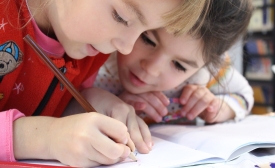finland

Katarzyna Rybka-Iwańska highlights Finland's global reputation as a result of the country prioritizing early childhood education and wellness.
People in Nordic countries aren't just among the happiest – they're some of the most generous, too, giving a large share of their incomes to international aid efforts and supporting government and business investment in developing countries, according to a new report from the Center for Global Development. Denmark, Sweden and Finland top this year's Commitment to Development Index, an annual ranking of 27 of the wealthiest nations in the world by how well their policies help people in developing countries.
Finland became the first country in the world to publish its own set of national emojis in December 2015 on the country branding website ThisisFINLAND.fi, produced by the Ministry for Foreign Affairs of Finland. A set of summer emojis was added to the selection on the Day of Finnish Identity in May 2016 and ahead of Finland’s two-year term as chair of the Arctic Council starting in May 2017. The Finland emoji collection has met with great success abroad, garnering numerous international awards and reaching about 240 million people through traditional and social media.
Using emojis to help shape the nation's image is a playful, but not frivolous approach to foreign policy. Finland is a highly educated country where tech is an important industry. The selection of emojis appears to be a way to highlight Finland's values and Arctic presence, while also demonstrating its tech expertise.
In addition to formal public diplomacy mouthpieces like Russia Today and Sputnik, Russia employs armies of paid trolls and botnets to generate false information that can later be circulated and legitimated as if it were true. Then, in 2016, Russian military intelligence went a step further, by hacking into the private network of the Democratic National Committee, stealing information, and releasing it online to damage Hillary Clinton’s presidential candidacy.
The South Africa based Sylt Foundation and Myanmar online journal, Be Untexed, collaborated to lead the event which included an art exhibition, workshop and poetry reading. Han Lynn, the curator of the art festival and member of Be Untexed online journal said, “‘Violent Memories’ is the long-term project of the ‘Transformation and Identity, Trauma and Reconciliation’ which includes eight different countries.”
In addition to the various groups of indigenous people who reside in the Arctic, eight countries Russia, Finland, Sweden, Norway, Iceland, Denmark, Canada, and the United States have claimed interest in the Arctic. Diplomacy between the different groups is required for cooperation and organization in the complicated region. Due to its importance in environmental security, sizable natural resource reserves, and remote location, the Arctic incentivizes cooperation through science diplomacy.







